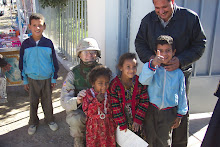Life is like a puzzle. To many it is puzzling. Things happen to us or to the world and we wonder how that fits. How do we interpret these pieces? We do this by what our family believes about them. Or what we are taught by our friends as we grow up. Teachers and other important people have an impact on us and our world view is developed. Yet most of the time we don't know we have a world view. We just think that what we are taught is the way it is.... Until we find someone who thinks differently than you. That throws a chink in the puzzle. Why, it's obvious that .... We tend to think in bits and pieces. By this I mean we have our social life and work life separate. Those who have faith in a religious system separate faith from their work life. Then they may have their married life and on and on. Our life is fragmented and in many ways frustrating. Some may like that but I think many of you don't. Let me list 10 pieces of the puzzle that make up a world view and I will tackle each one in this order. We have theology, philosophy, biology, psychology, ethics, sociology, law, politics, economics and history. Now these are academic pieces to the puzzle, but they all relate to everyone of us.
So we need to realize we have a world view and this world view interprets life for us. We need to examine our world view and keep what we believe is true and add or subtract others. But first, let us define a world view. Simply put it is a way we make sense of the world. It answers the questions, Where am I from? Why am I here? Where am I going? We need to start with the fundamental question of theology. EVERYONE has a theology even atheists. Their theology is that God does not exist. Their world view flows out of their lack of belief. As a Christian Chaplain my theology starts with God. Crosswinds has a presentation entitled, "Who's On First?" The presentation deals with this issue. Your starting point is of fundamental importance. Contact the ministry to have someone give your church or organization the presentation.
Colossians 1:15-21 gives the Christian the BIG PICTURE. The text says:
"And He is the image of the invisible God, the first born of all creation. For by Him all things were created, both in the heavens and the earth, visible and invisible, whether thrones or dominions or rulers and authorities___all things have been created by Him and for Him. And He is before all things, and in Him all things hold together. He is also the head of the body, the church; and He is the beginning, the first born from the dead ; so that He Himself might come to have first place in everything. For it was the Fathers good pleasure for all the fullness to dwell in Him, and through Him to reconcile all things to Himself, having made peace through the blood of His cross; Through Him I say, whether things on earth or things in heaven."
This big picture puts Christ at the center of everything. Jesus Christ created everything visible and invisible. He made all things for Himself. He holds everything together. He is the head of the Church. He was the first to rise physically from the dead never to die again. He is the pre-eminent One. He is God. Scripture tells us He is the Image of the invisible God and all the fullness of the Fathers good pleasure to dwell in Him.
Our theology starts with the Triune God who created all things. He started all things and holds everything together. God is now involved and will continue to be involved in His creation. How does this impact our thinking about the world and what happens to the world and how it impacts us. What kind of philosophy is generated from this kind of theology? Lets meditate on this first step, this BIG PICTURE. Remember to put the puzzle together we need to see the big picture and let that be the lens we view the world through. s

No comments:
Post a Comment